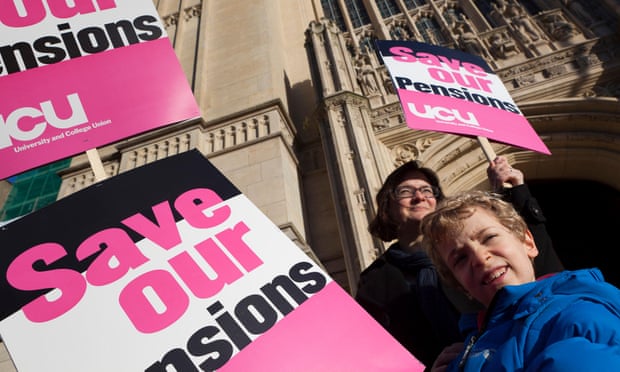Nicole Garcia Merida
International student from Guatemala, doing journalism at Cardiff University
As an international student I pay over £14,000 a year in tuition fees. That is without what it costs to travel back and forth to my home country for the holidays. When I first learned of the oncoming pensions strike I was aghast at the audacity of lecturers to simply bale on their students for 14 days because of something to do with their pensions. Not sufficiently outraged to publicly say something in a lecture, but enough to be resentful of it. Enough to want my money back.
It wasn’t until my dissertation lecturer spoke about it that I realised I shouldn’t really be outraged by the fact they’re striking, but by the fact that they need to. I think we all forget that we can read because of a teacher. We can do our jobs because of our teachers. But, in the eyes of the university management, lecturers are expendable. Their pensions and livelihood can be easily compromised, played with and taken away. Their interests aren’t going to be a priority, and their wellbeing isn’t really going to be taken into account.

There are many things I could complain about. The money I’m losing, the waste of my time, the unfairness of it all. But really this is just another case of blaming the messenger. There’s a small number of things I can actually do. I can support my lecturers in their choice to strike. I can write to my university to demand change. I can stand next to them when they protest and acknowledge their struggle.
Quick GuideWhy are university staff striking?
Show

Why are university staff striking?
University staff who are members of the University and College Union are angry at proposed changes to their pensions, which they argue could leave them up to £10,000 a year worse off when they retire. UCU say this would result in a loss more than £200,000 over the course of a retirement for a typical member of staff. Universities UK wants to change the Universities Superannuation Scheme from a defined benefit scheme – giving a guaranteed retirement income – to a defined contribution scheme, which would mean pensions would be subject to changes in the stock market. The union says young lecturers would be worst affected, with some losing up to half their pensions.
What is the argument for the changes?
Universities UK says its pension scheme has a £6bn deficit and it have a legal duty to put in place a credible plan to tackle it by this summer. Without reform, pensions contributions would have to rise steeply – and would mean spending cuts in other areas such as teaching, student support and research. Universities UK says that even after the changes the scheme would compare well with employer contributions double the private sector average.
What about students?
About 80,000 students at 30 of the universities affected have signed petitions. Many are supportive of striking staff but are demanding compensation for the hours of tuition they will miss because of the strikes. Students in England pay £9,250 a year, and have rights under consumer law. Whether these rights apply to industrial disputes is untested.
Patrick Loughrey
Warden of Goldsmiths, University of London
I fully respect the decision of staff members to strike. But industrial action comes at a cost and it would be extremely complacent to assume that Goldsmiths could survive a prolonged dispute – over which we have very little control – without long-term damage being done to our students and staff.
If pension contributions increase significantly, the only practical option open to us in the short term is fundamental restructuring of our operations. We would have to reduce staff and other costs, raise tuition fees where possible and increase the student-staff ratio.
However, I believe that all our staff have a right to good pensions. Universities play a hugely important role in public life, with institutions such as Goldsmiths having a major impact on cultural and creative endeavours across the globe. Alongside decent salaries and other employment provision, the contribution that all our staff make must be recognised in the form of fair and sustainable pensions.
Students are rightly concerned about disruptions to their study that industrial action will inevitably bring. I cannot predict what will happen with certainty, but the college will work to mitigate the effect on students as far as possible. Goldsmiths’ senior management would like to see a fair and speedy resolution to this dispute for all our sakes.
Joseph Attard
Graduate teaching assistant at King’s College London
I’m just starting out as a professional academic. I’ve only just started paying into the pension scheme and I and many of my colleagues stand to lose the most because the contributions we make from this point are going to be subject to this defined contributions scheme.
This is probably the most severe attack on university workers in my working life. But it goes beyond the pension scheme. This comes on the back of mass casualisation in academia, increases in fees and increases to vice-chancellor pay.
This strike really is a red line. We are very clear that if we are defeated in this dispute, it will be a signal to Universities UK and university bosses there’s nothing they can’t get away with and we will be pushed even further down the road to casualisation and marketisation.
With 14 days of strike action, it’s potentially pretty devastating for staff. We have a hardship fund – it’s not very much. I stand to lose pretty much all of my income from teaching for the latter part of the academic term. I’ve got colleagues who will struggle to pay their rent and who are really stressed out by the impact of the strike.
But the mood is good. It’s very confident. All the students I speak to, when I explain the ramifications, are happy to join in solidarity with us. The impact on their education in the short term will not be anything compared to the impact on the higher education sector in the long term if we don’t fight this.










